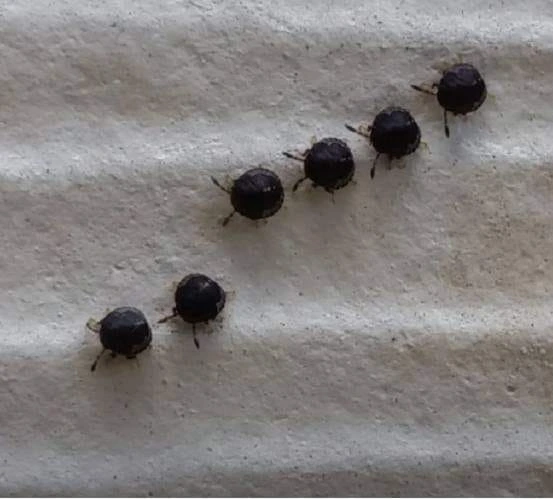Beware of those strange-looking “blueberries” you’ve spotted in your yard—they probably aren’t as healthy as they seem! Instead of a tasty snack, you might have encountered Homaemus Proteus, also known as the Jewel Bug or Shield Bug. These unique little insects are masters of disguise, often hiding in plain sight by mimicking the appearance of small, shiny blueberries. While they may not be something you see every day, they’re certainly captivating. Let’s take a closer look at these impostors to help you avoid mistaking them for a snack.
Introducing Homaemus Proteus: The Blueberry Scammer
Picture this: you’re in your garden, enjoying a peaceful day, and you spot what looks like a bunch of ripe, blue “berries” hanging from your plants. “Yum, a free treat!” you might think, ready to pick one and pop it into your mouth. But wait—before you take a bite, let’s hit pause.
What you’ve actually found are likely Homaemus Proteus, a small type of shield bug that’s perfected the art of camouflage. These little bugs are like nature’s own undercover agents, disguising themselves as harmless, delicious fruit to blend in with their surroundings and avoid being eaten by predators.
Why You Shouldn’t Eat or Handle Them
You might be wondering, why go through all the trouble of avoiding these little blue deceivers? Let me explain:
- Not Edible: First and foremost, Homaemus Proteus is not a snack. Unlike real blueberries, these bugs have a bitter, unpleasant taste that would leave you regretting your impulsive decision. While they won’t harm you in small quantities, they definitely don’t qualify as tasty or nutritious.
- Defensive Disguise: Their disguise isn’t just for fun—these bugs are serious about self-defense. The blue, berry-like appearance is designed to trick predators into leaving them alone, but there’s more. Some shield bugs, including the Jewel Bug, can release chemicals as a defense mechanism. If eaten, they might cause irritation or a mild reaction.
- Leave Them Be: Instead of rushing to remove these bugs, consider letting them live peacefully in your garden. They can actually play a role in the ecosystem, serving as food for birds and other small animals, which helps maintain the natural balance of your garden’s environment.
The Art of Disguise: How Homaemus Proteus Tricks You
One of the most fascinating things about the Jewel Bug is its ability to blend into nature. It takes on the appearance of small, shiny blue balls that mimic ripe berries, making it harder for predators to spot them. This trickery keeps them safe, as many animals (and even humans) might mistake them for fruit and simply pass by.
But don’t be fooled by their jewel-like appearance—these bugs are far from your garden’s next edible treat. The vibrant blue coloring is part of their survival strategy. It not only helps them blend in but also serves as a warning to predators that they may be unpleasant or harmful to consume.
What to Do If You Find Them in Your Yard
So, what should you do if you come across these sneaky little bugs?
- Observe, Don’t Disturb: You don’t need to remove them from your garden. They won’t harm your plants, and they’re not a major pest. In fact, Jewel Bugs are mostly harmless and can actually contribute to your garden’s health by serving as a food source for birds and other wildlife.
- Admire Their Beauty: Though they aren’t edible, Jewel Bugs can add an element of curiosity and beauty to your garden. Their shimmering, metallic appearance makes them stand out, turning an ordinary garden visit into a mini nature discovery.
- Avoid Handling: While Jewel Bugs are not dangerous to humans, it’s best not to handle them directly. If disturbed, they might release a foul-smelling chemical as a defense, which can be unpleasant. Use gloves or gently guide them away if you need to move them.
Conclusion: Not All That Glitters is Edible
The next time you’re in your garden and spot what looks like a tempting blueberry, remember to take a closer look. Those bright blue orbs might not be berries at all—they could be the clever Homaemus Proteus, also known as the Jewel Bug. While they may not belong in your fruit basket, these little bugs are a beautiful and unique part of the natural world, contributing to the ecosystem in their own quiet way.
So, enjoy the sight of these little blue gems for what they are—charming additions to your garden’s landscape—and resist the urge to taste them! Instead, let them do their job in keeping your garden diverse and balanced.
